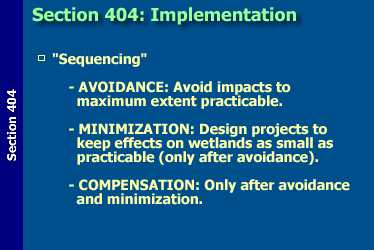

The essence of Section 404 policies is the concept of "sequencing." This is a step-wise process, in which one must go through one step before going on to the next.
Step 1 is called "avoidance." Whenever practical, filling of waters of the United States should be avoided. A key issue in avoidance is whether the proposed activity is dependent on being located on or adjacent to a body of water. A marina, for example, would be dependent. A tennis court or shopping mall would not. Another issue is whether the plot of property on which the proposed project would be located contains sufficient amounts of dry land to accommodate the project.
If an impact on wetlands cannot be avoided entirely, then attempts to minimize the impacts are required. Often, changes in the position or design of a project can significantly reduce the amount of wetland acreage affected.
The final step in 404 sequencing is compensation. A long-standing federal policy called "no net loss" of wetlands drives compensation requirements under 404. The basic concept is that for every acre of wetland lost, at least one functionally equivalent acre of wetland must be restored. "Creation" of wetlands at sites where wetlands did not naturally occur is less acceptable than restoration of destroyed or degraded wetlands, because efforts to create wetlands have been deemed largely unsuccessful. Only in exceptional circumstances will preservation of existing healthy wetlands be accepted as mitigation for loss of wetlands permitted under Section 404.
For more information, visit:
EPA's Section 404 of the Clean Water Act: An Overview
Army Corps of Engineers Regulatory Program